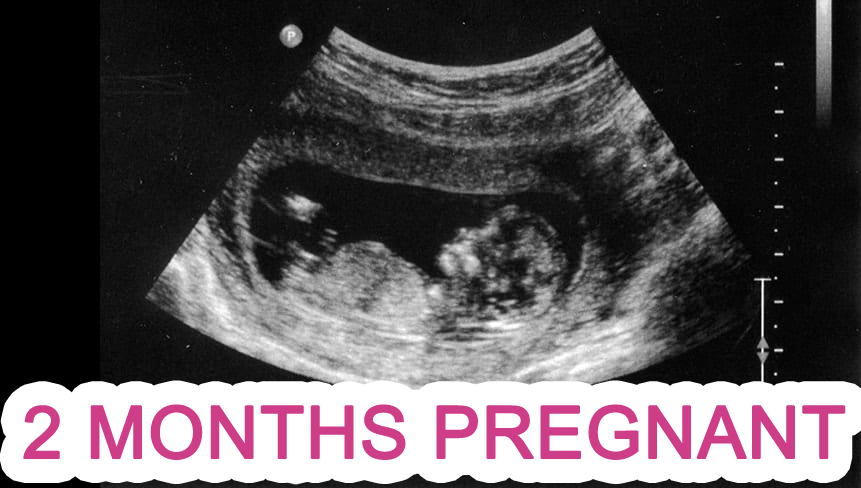While pregnancy is often filled with joy and anticipation, it can also bring a surge of doubts and queries. Indeed, at two months pregnant, you are on the cusp of a significant milestone in your gestational journey – the end of the first trimester. This blog post will unveil what truly happens during this exciting yet enigmatic phase. We’ll dive into the symptoms you might be experiencing, and how they signify your baby’s rapid and astounding development. Additionally, we’ll unwrap actionable prenatal care tips that can catalyze a healthy and comfortable nine months ahead. So whether you’re swimming through an overwhelming sea of information or feeling lost as to what comes next, this guide promises to be your helpful compass navigating the remarkable voyage of being two months pregnant.
During the second month of pregnancy, significant developments occur in the embryo. Major organs begin to form, and limbs start to develop. Around week 7 or 8, the heart forms, fingers and toes start to appear, and external features like eyelids and ears begin to take shape. It’s important to seek prenatal care during this stage to monitor organ development and ensure a healthy pregnancy.
Table of Contents
Understanding the Second Month of Pregnancy
Congratulations, you’re two months pregnant! At this stage, the ball of cells has transformed into an embryo, and major internal organs start developing. This embryonic stage lasts about five weeks. During week five to six, the embryo is less than 1/5 inch long but starts showing cardiac activity which sounds like a heartbeat on an ultrasound. Arms and legs also begin to develop; the neural tube begins forming, and the umbilical cord starts developing.
During week seven to eight, the embryo is 1/4 to 1/2 inch long. The heart forms, fingers and toes develop; arms bend at the elbows, external ears, eyes, eyelids, liver and upper lip begin forming. The sex organs are not yet developed until the seventh or eighth week.
It’s critical to note that prenatal care is essential at this stage of pregnancy to monitor organ development and ensure a healthy pregnancy. Planned Parenthood provides telehealth and in-person services for prenatal care.
Notable Symptoms at Two Months
As expected, your body is gearing up for this new adventure with notable symptoms kicking in around the two-month mark. These include breast tenderness, fatigue, frequent urination, heartburn, nausea and vomiting due to rising hormone levels. Although these symptoms may be bothersome initially, they’re typically a sign of a healthy pregnancy.
However, if these symptoms worsen or interfere with daily activities dramatically, it’s best to seek medical assistance as soon as possible. Furthermore, some women may experience other symptoms such as mood swings or headaches caused by surges in hormones. Still, these too should subside after the first trimester.
Remember that symptom severity varies among women and might come and go throughout pregnancy. Therefore no comparison should be made between women experiencing pregnancy-related ailments.
Now that we have covered notable symptoms at two months, let’s explore some prenatal care tips for a healthy pregnancy.
Physical Changes
When you’re 2 months pregnant, several physical changes may occur in your body. Most women begin to experience morning sickness which is characterized by nausea and vomiting, often worse in the morning but can happen at any time of day. Your appetite may be affected causing you to eat smaller meals and more frequently as opposed to eating one large meal. Breast tenderness is also common and may be accompanied by pain, sensitivity or soreness.
For example, Sarah found that she couldn’t tolerate the smell of fried food without feeling nauseous while Jane found that she needed to snack continuously throughout the day. Each woman’s experience with pregnancy is unique, so it’s crucial not to compare symptoms.
Now that we’ve covered some changes that may occur physically let’s dive into embryo development.
- According to the American College of Obstetricians and Gynecologists, between weeks 5 and 8 of pregnancy, the embryo grows from less than 1/5 inch to about 1/2 inch long.
- During this same time period, key internal organs begin forming and cardiac activity begins to be detectable via ultrasound.
- Common symptoms of pregnancy in the second month include breast tenderness, fatigue, frequent urination, heartburn, nausea, and vomiting. As per March of Dimes research, up to 85% of pregnant women experience these symptoms during their first trimester.
Embryo Development
During the second month of pregnancy, rapid changes take place during embryonic development. The ball of cells growing inside the uterus transforms into what resembles somewhat a tiny human being. The embryo is less than 1/5 inch (4-5mm) long and starts showing cardiac activity which sounds like a heartbeat on an ultrasound. Arms and legs also begin to develop, and the neural tube begins forming.
Think of it like a masterpiece in progress – intricate details slowly coming together over time.
The umbilical cord starts developing during this stage as well; this will serve as the fetus’s lifeline for supplying nutrients and oxygen throughout the gestation period. By week seven or eight, the embryo grows to approximately 1/4 to 1/2 inches (7-14mm) long. The heart forms, fingers and toes develop; arms bend at the elbows, external ears begin forming alongside eyes and eyelids. The liver starts functioning, and upper lip begins shaping up.
Understanding these developments help interpret what you see on an ultrasound and appreciate the amazing transformation taking place. It’s essential to treat your body with utmost care to ensure that these crucial organs and systems develop healthily.
Now that we have explored embryo development, let’s move on to important hormonal changes experienced during the second month.
Important Hormonal Changes
The second month of pregnancy marks an essential milestone in fetal development as it is when the ball of cells transforms into an embryo, and internal organs start to take shape. During this period, significant hormonal changes are also taking place within the mother’s body. These changes include a spike in estrogen levels, which prepares the uterus to provide nourishment for the fetus. Progesterone levels also increase, supporting proper growth and development, leading to symptoms such as fatigue and nausea.
Managing Symptoms in the Second Month
Managing symptoms in month two of pregnancy can be challenging for some women. The most common symptoms include breast tenderness, frequent urination, heartburn, nausea, vomiting, and fatigue. It’s crucial to remain hydrated during this period since dehydration can trigger some of these symptoms. Eating smaller, more frequent meals may also help manage nausea and heartburn.
Exercise can also help reduce fatigue. Engaging in light activities such as walking or swimming can boost energy while improving overall health. Good sleeping habits like maintaining a regular sleep pattern and avoiding caffeine intake before bedtime can help alleviate fatigue.
For pregnant mothers experiencing headaches during their second month: Tylenol is considered safe for occasional use with your doctor’s approval. However, Advil is not recommended since it can interfere with fetal blood flow and cause other complications.
Lastly, if you experience any concerning symptoms like severe cramping or bleeding, it’s essential to contact your healthcare provider immediately for assessment.
Essential Prenatal Care Tips
Prenatal care is crucial to monitor the health of both the mother and baby during pregnancy. It involves a series of appointments with a healthcare provider, ranging from regular checkups to screening tests and ultrasounds. Below are some essential prenatal care tips that every expecting mother must follow for a healthy pregnancy.
First and foremost, schedule your first prenatal appointment as soon as you suspect you are pregnant or miss your period. Most healthcare providers recommend that you visit them within the first eight weeks of your pregnancy. During this visit, your doctor will evaluate your overall health and assess any potential risks for complications.
Take prenatal vitamins daily, including folic acid, which helps in the neural tube’s development and prevents birth defects. Additionally, these multivitamins contain other essential nutrients that promote a healthy pregnancy.
Eat nutritious foods rich in vitamins and minerals like fruits, vegetables, whole grains, lean protein, and low-fat dairy products. Avoid undercooked or raw seafood, unpasteurized dairy products, deli meats, caffeine, alcohol, and tobacco.
Stay physically active by engaging in light exercises like walking or yoga regularly. However, consult your doctor before starting any workout regimen to ensure it’s safe for you and your baby.
Get adequate rest and sleep when possible. Fatigue is normal during pregnancy since your body is working overtime to nourish the developing fetus.
Think of pregnancy as running a marathon; you need to pace yourself by setting aside breaks to rest frequently.
| Screening Test | Purpose |
|---|---|
| Blood Tests | Checks for anemia or infections like HIV/AIDS |
| Urine Tests | Identifies conditions such as urinary tract infections |
| Ultrasound | Visualizes fetal growth patterns and detects abnormalities |
| Genetic Testing | Evaluates baby’s risk for inherited disorders |
| Glucose Screening | Tests for gestational diabetes |
Attend all of your scheduled prenatal appointments, including regular checkups, ultrasounds, and screening tests. These visits provide an opportunity to monitor the baby’s growth and detect potential problems early on.
Keep track of any concerning symptoms like vaginal bleeding, fluid leaking from the vagina, severe headaches, abdominal pain, or high fever. Contact your doctor if you experience any of these symptoms.
Make use of support systems available to you during pregnancy. Reach out to family and friends for emotional support or join online groups where you can connect with other expecting mothers.
While some may resort to online communities for support and guidance in addition to conventional healthcare providers, it’s important not to use everything one reads online as gospel truth. Rather than self-diagnose based on what you’ve read online, seek medical advice from healthcare professionals who can accurately evaluate your symptoms.
The above tips will help ensure a healthy pregnancy by keeping both the mother and baby in excellent health. Remember that each pregnancy is unique, so always consult with your healthcare provider for tailored advice that suits your individual needs.

Elizabeth Baker is a mother of three, wife, and the passionate mind behind this pregnancy and baby development resource. She balances her love for understanding every stage of child growth with her duties as a parent. When she’s not sharing her experiences or studying child development, Sarah enjoys family time, reading, and practicing yoga. She believes in the power of shared knowledge to enhance the beautiful journey of parenthood. Read more About me.
